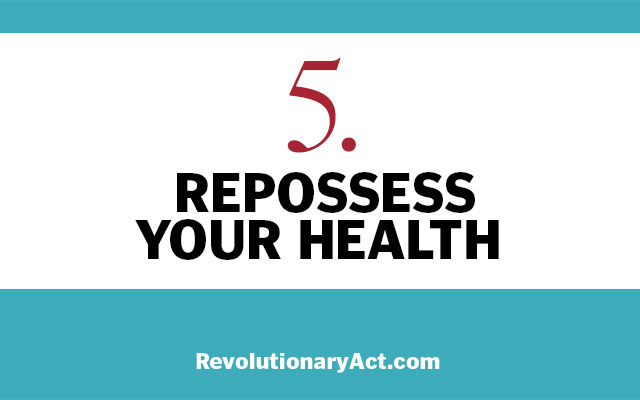It’s often said that we take our health for granted right up to the moment we become ill or injured. And I think that’s true. We humans are inclined to take a lot of important things for granted until they are threatened or lost.
What’s weird about our relationship with our health, though, is that almost as soon as it begins to falter (as the predictable result of neglect), we proceed directly from taking it for granted to simply rejecting our responsibility for it.
Rather than re-declaring our ownership and jumping into corrective action (“Gads, it appears I have left this valuable vessel unmaintained and on autopilot for far too long! I shall reclaim command of it at once!”), we wring our hands and proclaim helplessness (“Eek, this darn thing isn’t working right! Somebody, fix it, please!”).
I don’t mean to ridicule or blame the victim here. Certainly, there are illnesses and injuries that can come upon any of us, unbidden, and over which we have little or no control. And there are certainly people living in such desperate, entrenched conditions of poverty or violence that their choices are tragically limited.
So yes, in some cases, there really is little to do but manage a given health challenge or injury with as much consciousness and self-compassion as we can muster. But here in the United States, where chronic lifestyle-related conditions account for the vast majority of our medical interventions and expenses, such scenarios tend to be the exception, and not the rule.
The rule — the culturally defined norm — has been for us to chronically abuse our bodies. We simultaneously stuff and starve them with nutritionally devoid, metabolism-disrupting foods and beverages. We dump them onto chairs or sofas and forget about them for hours or days at a time. We flood them with stress-induced hormones and pro-inflammatory chemicals. We deny them any opportunity for rest, repair, and recovery. And then we expect all our systems to perform perfectly.
Not surprisingly, this does not pan out very well.
For a while, particularly while we are young, our bodies may appear to take all kinds of abuse (from 64-ounce sodas to 80-hour workweeks) with amazingly little complaint. At some point, though, our digestive, immune, biochemical, or neurological systems grow weary of all the mistreatment and begin to cry foul.
Little by little, our organs, skin, joints, and brains start raising subtle and not-so-subtle alert flags. Weird sensations, odd rashes, funky operational quirks, and annoying irregularities emerge. If we ignore those, our bodies may start clanging an increasingly loud series of nasty-symptom alarm bells. Eventually, when the symptoms get serious or numerous or painful enough, we get concerned.
Suddenly, we are no longer taking our health for granted. We’re now officially worried about it.
At this point, one of two things typically happens: 1) We place ourselves into the hands of the conventional medical system, where we are promptly given a diagnosis (official name) for our suffering, and offered some accompanying prescription medications or surgical treatments; or 2) we begin assiduously avoiding healthcare entirely.
We do the former because it’s the convenient, socially sanctioned solution or because we’re not aware of any better alternatives. We do the latter because we are afraid of getting bad news, because we suspect we won’t be able to afford the care we’ll be prescribed, or because we’ve seen enough of the conventional medical system in action that we don’t have a whole lot of confidence it’s actually going to help.
Some may also have a well-founded fear that seeking medical care could actually do them more harm than good. After all, medical errors and pharmaceutical side effects have long been ranked among this country’s leading causes of death (I’ll address this in more depth when I get to Revolutionary Acts No. 6, 7, and 8).
OK, so how does one begin to repossess one’s health? Here are my top-two suggestions:
1) Take an honest inventory of your daily choices. Are you eating primarily nutritious whole foods? Eating meals calmly and consciously? Drinking plenty of clean water? Getting some vigorous daily activity? Spending time outdoors? Managing, limiting, and offsetting stress; getting plenty of good sleep; building in time for relaxation, relationships, love, and fun? Are you carefully limiting your intake of sugar, flour, alcohol, caffeine, and other recreational drugs (including cigarettes)? Are you avoiding fast food and sweetened drinks (including diet sodas)? Are you 100 percent clear about the food intolerances, toxicities, and chemical sensitivities you’re vulnerable to? Do you prioritize your health and well-being when making decisions about your time, career, finances, relationships, and other life priorities?
Basically, are you doing at least a solid smattering of the 101 Revolutionary Ways to Be Healthy? If not, that’s probably why you — and 80 percent of other U.S. adults — aren’t feeling so great (or are destined to start feeling less than great before long).
Don’t judge yourself too harshly, though: In the society we live in, doing all of this stuff simultaneously is freakishly challenging and counterintuitive, particularly at first. The more you manage to do, the better you’ll feel, and the easier it will become.
2) Seek out more progressive, proactive healthcare (vs. sick-care). That might mean a physician or nurse practitioner with integrative training or a specialty in functional medicine (for more on that, see “Functional Medicine: A Science Whose Time Has Come”). It might be a nutritionally savvy chiropractor. It might be a naturopath, an osteopath, a practitioner of Traditional Chinese Medicine, a highly trained nutrition pro or health coach, or some combination of all of the above.
What you are looking for is someone who is interested in (and capable of) helping you sort out the root causes of chronic lifestyle-related problems, and then helping you make the changes necessary to get and stay healthy.
What you are not looking for is what functional-medicine pioneer Jeffrey Bland, PhD, refers to as “the tyranny of the diagnosis”: a pat naming of your problem or problems (e.g., “migraines,” “acid reflux,” “irritable bowel,” “psoriasis”) followed by your relegation to a future of ongoing sick-care that does little to reverse the root causes of your malaise.
Above all, know this: There’s no one surefire way to repossess your health, no single, dramatic act of reclamation. On the contrary, there are a thousand small, daily opportunities to take charge of your own well-being, to cease taking your health for granted, to start more fully appreciating the the miraculous and resilient human body within your command.
Revolutionary Reading
“The New View of Health” — The evolving perception of proactive healthcare and the importance of moving beyond a “fix me” mentality.
“Owning Your Health” — Your body is your most valuable piece of personal property. Shouldn’t you be the one in charge of keeping it healthy, happy, and sound?
“The Promise of Integrative Medicine” — Disillusioned by decades of disease-focused medicine, both doctors and patients are shifting their focus toward whole-person health.




This Post Has 0 Comments